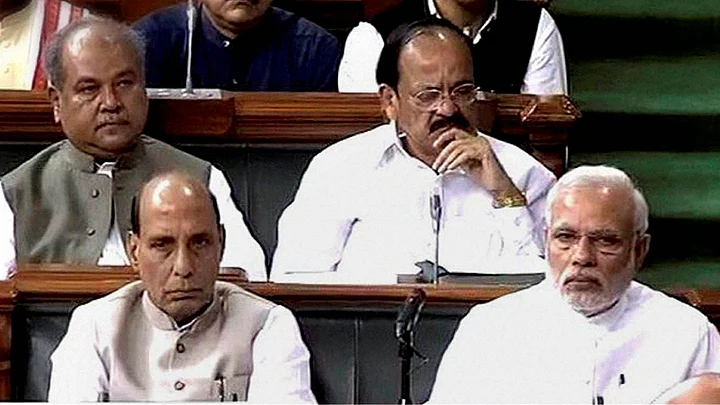“….however good a Constitution may be, it is sure to turn out bad because those who are called to work it, happen to be a bad lot. However had a Constitution may be, it may turn out to be good if those who are called to work it, happen to be a good lot. The working of a Constitution does not depend wholly upon the nature of the Constitution.”
—B R Ambedkar’s Constituent Assembly speech, November 25, 1949
It was another day of ruckus inside Parliament, pandemonium becoming synonymous with the very practice of our brand of democracy. As the Congress screamed its lungs out after 25 of its MPs were suspended for five days, with party president Sonia Gandhi calling it a black day for democracy, we were left flummoxed at the state of affairs that seem to show little change. What one senses is that MPs in the treasury and opposition benches will fail to facilitate the smooth functioning of both Houses on one pretext or another.
The ignominy of being suspended is, however, not novel for Parliament which has witnessed several such instances in the past. An excerpt from Madhav Godbole’s book ‘India’s parliamentary democracy on trial’ illustrates how suspension of MPs as an instrument of instilling some degree of discipline was included in the rule books:
In December 2001, the Rules of Procedure and Conduct of Business of the Lok Sabha were amended for the first time since they were framed in 1952 to provide for automatic suspension of any member who troops into the well of the House or otherwise obstructs its business. It was laid down that the suspended member would not be entitled to travelling and daily allowance for the period of suspension, nor would he be allowed to attend meetings of parliamentary committees during the suspension period.
Godbole goes on further to explain how our MPs justify the unpretentious outlook, keeping the very act of legislation at bay. Sample this:
“It was shocking to read the then Indian Parliamentary Affairs Minister Ghulam Nabi Azad telling in the BBC Hindi radio programme that British MPs have also hurled slippers at each other. (Tribune, Chandigarh, 26 July, 2005). “
—Excerpt from Madhav Godbole’s ‘India’s parliamentary democracy on trial’
Streaks From The Past
The Congress might be mulling over its next strategy to shame the current regime. With close to 43% of its MPs suspended, the grand old party has reason to make a hue and cry. The history of Parliament, however, is replete with examples when MPs were shown the door for crossing the ‘laxman rekha’ of rules and regulations:
1) March 15, 1989: 63 MPs were suspended for a week following the commotion over the Thakkar Commission report (Report of Justice Thakkar Commission of Inquiry on the Assassination of the Late Prime Minister Smt. Indira Gandhi)
2) September 3, 1962: Congress MP, Godey Murahari (member of the 6th Lok Sabha) was suspended for the remainder of the session for unruly behavior
3) July 25, 1966: Congress MP Godey Murahari and Janata Party leader Raj Narain suspended for a week for unruly behavior, the parliamentarians had to be escorted by calling the marshalls after their refusal to withdraw.
(Source: PRS)
The 15th Lok Sabha unfortunately also witnessed similar turn of events as the UPA government tried to push through the Telangana bill.
4) February 13, 2014: Lok Sabha proceedings hit a new low with an MP using pepper spray to lodge his protest following which 17 MPs were suspended by the then speaker Meira Kumar
5) September 2, 2013: 11 MPs belonging to the Seemandhara region were suspended as they tried to disrupt proceedings of the house by holding placards against the division of Andhra Pradesh.
Penalty for Obstructionism
Whether suspension as prescribed in the rule book works has emerged as another reason for stalling Parliament.
“This is an extreme step when nothing works. It was undemocratic not to allow the House to function, to discuss, debate or deliberate upon, if an MP tries to obstruct the functioning of the house, he’s guilty of breach of parliamentary privilege and contempt. They are bringing disrepute to the Parliament”.
—Subhash Kashyap, Constitutional Expert
In fact, the Speaker can go a step ahead and is empowered to take stringent measures to ensure some sense of order in the Lok Sabha.
“The House can decide to expel a member, these provisions though should not be used ideally but are present in the rules”.
—Subhash Kashyap, Constitutional Expert
It might be coal scam and a slew of corruptions when UPA was in power and it might be Lalitgate and Vyapam scam now when NDA holds the reigns of power, the taxpayer doesn’t know who to hold accountable for the loss of money that he is incurring with every passing day.
